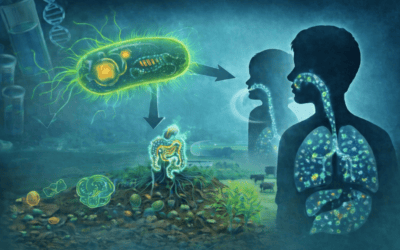It is never too late to support the body’s innate ability to heal itself, and as we continue to navigate the choppy waters of the COVID-19 storm, optimizing immune function should be one of our primary goals. A strong and balanced immune system is vital in defending ourselves against a variety of pathogens, and can aid in preventing the development of autoimmune disorders.
Limiting Toxins
A first step in creating the foundation of a strong immune system is to reduce environmental toxic substances, also known as immunotoxicants. Many of the substances used in the production of furniture, cars, conventional foods, personal care products, and cleaning products are disruptive to the endocrine system, negatively impact immunity, and are known carcinogens. Limiting exposure to these toxic substances lays a solid groundwork for building immunity.
The Importance of the Microbiota
Next, we turn to the microbiota, a collection and community of incredibly important organisms that reside in our intestines. Microbiota are key players in maintaining our immune system. Microbiota can be adversely impacted by antibiotics, which we may be exposed to in a variety of forms. In addition to prescribed pharmaceuticals, antibiotics can also be found in meat from animals given antibiotics, and pesticides, like the herbicide Glyphosate.
“Certain ingredients in processed foods, such as emulsifiers, have also been shown to adversely affect the microbiota. Over-the-counter drugs (acetaminophen and acid-blockers), can alter the microbiome as well. “
In addition to their immunological role, the microbiota produce vital nutrients such as B vitamins and folate, and are also the first line of defense in detoxification, stepping in even before the liver. Studies have shown that our microbes communicate with the innate immune system (one of two divisions of the immune system). Certain cells of the innate immune system, known as monocytes, can travel through part of the nervous system, via the vagus nerve, and chat with parts of the brain. This gut-brain axis, and hence brain function, can be modulated by diet, probiotics, exercise, and stress level.
Our diets should not only nourish us, but the microbes that work so diligently on our behalf. They enjoy organic, whole foods free of chemicals, rich in antioxidants and polyphenols, and filled with fiber (their favorite food)!
“An organic, colorful, plant-based diet, with clean protein and healthy fats, will create a very robust microbiota and hence, a balanced and strong immunity. Fermented foods should also be part of the diet, and there are many to choose from, such as sauerkraut, miso soup, pickles, kimchi, kombucha, yogurt, and kefir.”
Picking Your Probiotics
Probiotics can be a healthy adjunct to the diet, but selecting which strains to consume, and understanding how much to take can be overwhelming. Literature on the microbiome has exploded in recent years, and probiotics are now being designed specifically to assist with certain disorders. A trained holistic health provider can help you navigate these choices, but the chart below can serve as a general guide when selecting a probiotic.
In general, some of the most universally valuable probiotics include: lactobacillus acidophilus, paracasei, plantarum, rhamnosus, bifidobacterium bifidum, lactis, and saccharomyces boulardii. Five billion colonies may be a good place to start. Please note that these are only guidelines and are not intended to treat any specific individual or disorder.
While we try to maintain an environment free of immunotoxicants, exposures can occur, despite our best efforts.
“Two simple reminders to assist with the detoxification process are getting enough sleep and maintaining adequate hydration.”
While sleeping, the brain’s glymphatic system goes to work, mopping, sweeping, and dumping toxic substances. Staying hydrated allows the lymph system, an unsung hero in immune health, to help remove those unwanted substances to the detoxification centers: liver, kidney, lungs, and skin. I recommend filtered water with a squeeze of fresh lemon juice for alkalinization.
We’ve all heard of the benefits of exercise, but it can be difficult to understand exactly how exercise impacts our immune system. While exercising, immune-promoting cells travel more quickly to get to their targets. Exercise has also been shown to increase the production of macrophages, a type of cell produced by the innate immune system, which is necessary to combat uninvited viruses and bacteria. But balance is key and too much exercise has been shown to reduce white blood cells and increase certain stress-induced hormones.
“During these stressful times, we can power up our immune systems with a few simple, yet important actions. Getting out of our cars, going for walks in the beautiful outdoors that surround us, staying hydrated, and curating a diet rich in seasonal veggies, herbs, and nutritious proteins, will help us maintain a balanced and strong immunity.”
The article was written by Dr. Michelle Perro for Good Earth Natural Foods



